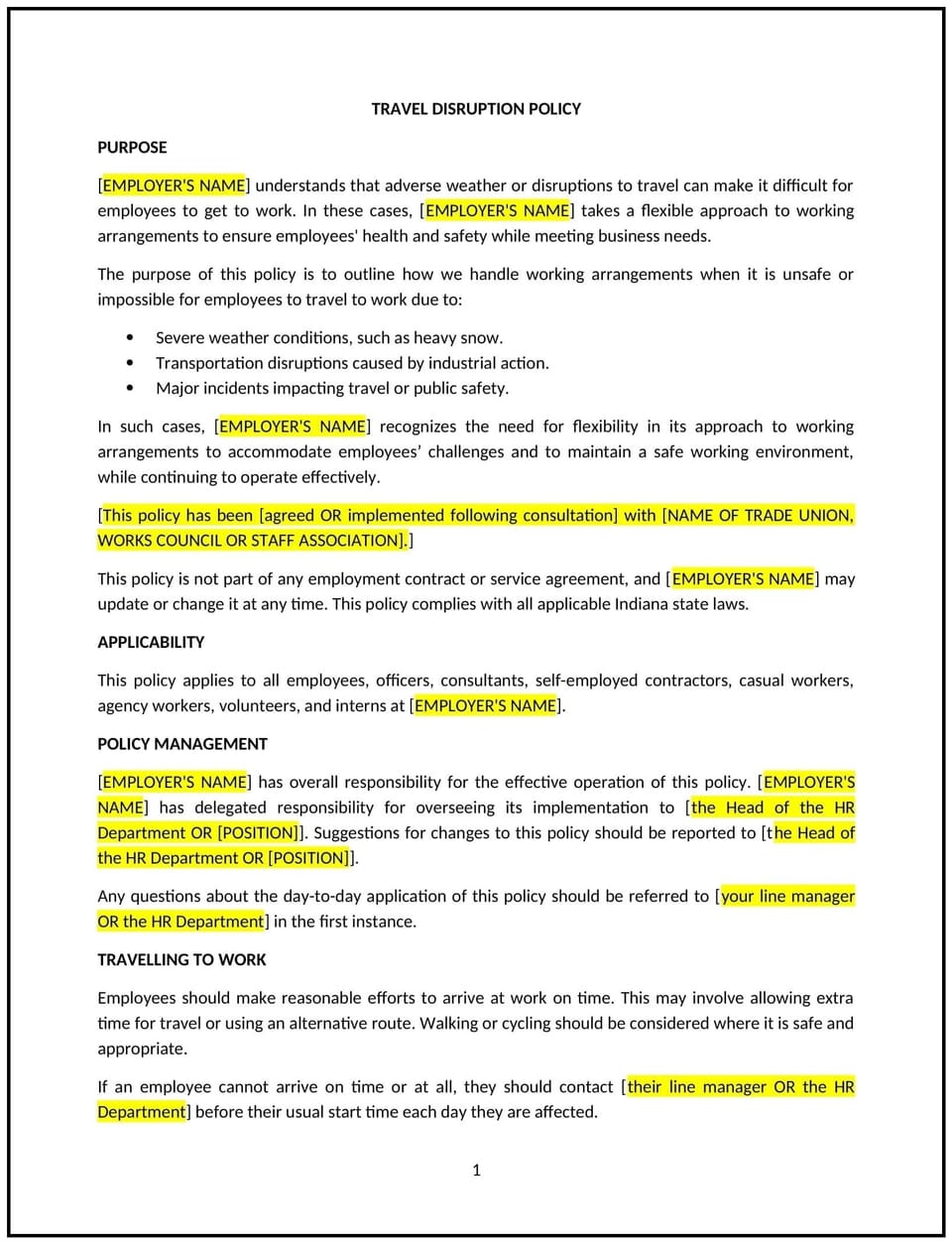Travel disruption policy (Indiana): Free template

Travel disruption policy (Indiana): Free template
This travel disruption policy helps Indiana businesses manage unforeseen travel interruptions affecting employees on business trips. It provides guidelines for addressing delays, cancellations, and other disruptions, ensuring employee safety and minimizing the impact on business operations. The policy also outlines reimbursement procedures and contingency measures to support employees during travel disruptions.
By implementing this policy, Indiana businesses can protect their employees, reduce confusion, and maintain continuity during travel-related challenges.
How to use this travel disruption policy (Indiana)
- Define travel disruptions: Specify what constitutes a travel disruption, such as flight cancellations, delays, adverse weather conditions, or unexpected personal emergencies.
- Outline employee responsibilities: Require employees to notify their manager or the designated travel coordinator immediately upon experiencing a disruption. Include guidelines for seeking assistance from travel agencies or providers.
- Provide reimbursement guidelines: Detail which expenses incurred due to travel disruptions are eligible for reimbursement, such as additional lodging, meals, or transportation costs.
- Include contingency measures: Establish procedures for employees to follow during disruptions, such as rebooking travel, securing temporary accommodations, or accessing emergency contact information.
- Address health and safety: Emphasize that employee safety is the top priority and provide steps for seeking assistance during emergencies.
- Specify communication protocols: Outline how employees should stay in touch with their manager and provide updates on their travel status or revised plans.
- Clarify expense limits: Set clear reimbursement limits for expenses incurred during disruptions to ensure consistency and cost control.
- Review and update regularly: Periodically assess the policy to ensure it aligns with current travel risks, business needs, or Indiana regulations.
Benefits of using this travel disruption policy (Indiana)
Implementing this policy provides several key benefits for Indiana businesses:
- Ensures employee safety: Prioritizes employee well-being during travel disruptions, providing clear guidance and support.
- Promotes transparency: Clearly defines responsibilities and reimbursement criteria, reducing confusion during unexpected events.
- Minimizes business disruptions: Provides structured procedures for managing delays or cancellations, ensuring employees can adapt quickly.
- Controls costs: Establishes limits on reimbursable expenses, helping businesses manage travel budgets effectively.
- Improves employee confidence: Demonstrates a commitment to supporting employees during travel challenges, fostering trust and morale.
- Enhances compliance: Aligns with Indiana labor and travel reimbursement regulations to avoid legal risks.
Tips for using this travel disruption policy (Indiana)
- Communicate the policy: Share the policy during onboarding and prior to any business-related travel to ensure employees understand its purpose and procedures.
- Provide emergency contacts: Include a list of emergency contacts, such as travel coordinators or managers, for employees to reach out to during disruptions.
- Use travel insurance: Encourage the use of travel insurance for added protection against unexpected events, especially for international or high-risk travel.
- Monitor expenses: Track and review travel disruption expenses to ensure adherence to the policy and identify areas for improvement.
- Offer training: Provide employees and managers with guidance on handling travel disruptions to ensure they are prepared and informed.
- Stay adaptable: Regularly review the policy to address new travel risks or changes in business needs.
Q: What qualifies as a travel disruption under this policy?
A: Travel disruptions include flight delays or cancellations, adverse weather conditions, transportation strikes, and unexpected personal emergencies that impact business travel.
Q: What expenses are reimbursable due to travel disruptions?
A: Reimbursable expenses may include additional lodging, meals, transportation, or fees associated with rebooking travel. Limits and exclusions should be specified in the policy.
Q: How should employees report a travel disruption?
A: Employees should notify their manager or designated travel coordinator as soon as possible and provide details about the disruption and any immediate needs.
Q: Are there limits on reimbursable expenses during disruptions?
A: Yes, businesses should set clear limits on expenses such as daily meal allowances or maximum lodging costs to manage budgets effectively.
Q: What should employees do if they are stranded due to a disruption?
A: Employees should prioritize their safety, secure temporary accommodations if needed, and communicate regularly with their manager or travel coordinator to coordinate next steps.
Q: Does this policy apply to personal travel?
A: No, this policy only applies to business-related travel authorized by the company.
Q: How can businesses ensure compliance with this policy?
A: Businesses should provide training on the policy, track reimbursement claims, and maintain clear documentation for all travel disruption-related expenses.
Q: How often should this policy be reviewed?
A: The policy should be reviewed annually or whenever significant changes occur in travel risks or business operations.
This article contains general legal information and does not contain legal advice. Cobrief is not a law firm or a substitute for an attorney or law firm. The law is complex and changes often. For legal advice, please ask a lawyer.


